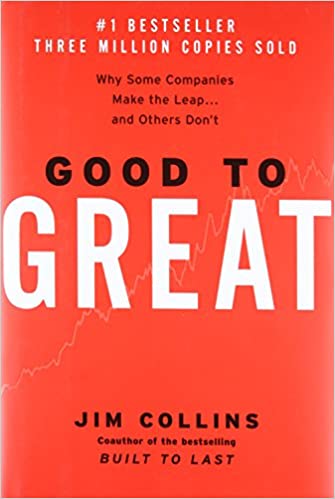Good to Great — Book Summary
Introduction
The book was written as part of a 15-year survey in which companies and their methods were studied. Jim Collins analyzed 1435 good companies and their 40-year history. Of these companies, the author found 11 companies that became the greatest companies in the world.
Analyzes were made of how companies managed to overlap the market during different periods. The results were based on analysis of a series of variables such as strategies adopted by companies, their technologies, and leadership styles. It is important to remember that this book is not based on any specific theory, but the results of the analysis made by the author.
Interesting quotes from the book
Greatness is not a function of circumstance. Greatness, it turns out, is largely a matter of conscious choice, and discipline.
— Jim Collins, Good to Great
Great vision without great people is irrelevant.
— Jim Collins, Good to Great
For, in the end, it is impossible to have a great life unless it is a meaningful life. And it is very difficult to have a meaningful life without meaningful work.
— Jim Collins, Good to Great
Summary of the book Good to Great
People Are Disposable
In these companies, employees who do not perform their duties correctly are fired. Only those that add value to the company matter.
These top companies evaluate their employees in this following way:
Productivity
This step begins when the employee is hired, where the manager must explain which method will be adopted to measure the productivity of each employee. When the employee is not being productive, it must be assessed what has caused this scenario and how this situation can be circumvented. If the actions performed are not enough, it is time to assess whether the professional should be fired or not.
Incompatibility
Every company has its organizational culture, which covers several aspects: standards, conduct, values, and principles. The employee must adapt to this organizational culture and not the other way around. Therefore, in some cases, there may be an incompatibility between the principles of the company and the employee, something that can affect the entire team. Therefore, talking to the employee to hear their suggestions and complaints can be useful to improve the situation, but when this is not possible, dismissal is the best option.
Disharmony
He is an extremely dissatisfied employee, who complains all the time, creates conflicts, and hinders the performance of the entire team, creating a climate of general dissatisfaction.
In this case, it is important to listen to this employee before his dismissal, as his complaints can also be the dissatisfaction of other employees. If dissatisfaction cannot be resolved, the best alternative is dismissal, before the case moves on to other spheres.
People are not the most important asset; the right people are.
Successful Companies Do Not Rush
They divide objectives into stages and thus achieve long-term success. In the corporate world, it is necessary to know how to deal with afflictions, anxieties, fears, doubts. Furthermore, it is necessary to understand that it is useless to be immediate when there is a set time for long-term success.
The Importance of Feedback
Every manager must understand the importance of feedback and how to use it for improvement. In this way, the team can deliver better results. Sometimes, feedback is seen as negative. Managers are afraid of being misunderstood by their subordinates, and employees are afraid to expose opinions, which could be used to improve the company. Feedback is one of the most important mechanisms for the growth of professionals and teams. Understanding the importance of constant and well-done feedback for the personal and professional development of employees is one of the essential points of good leadership. When the company understands what is wrong, it is an opportunity to grow.
Culture of Discipline
Considered a determining factor for success, discipline is related to responsibility and organization. The term can be used in several aspects, both in professional and personal life. Human beings learn from childhood that to achieve goals it is necessary to respect procedures. It is no different in the business world: for the company to be successful, there must be discipline from the leaders and employees.
Be the Best
Companies that want to stay on top need to be performing in their best, changing the way they think and act to achieve more effective and unique solutions for their customers every day. There will always be things to be done, the process of evolution will never end. It is always necessary to be ahead of the market and not only pay attention to your market. There is no bigger limit to growth than connecting with like-minded people. Look for new types of behavior and thinking and bring it to your world. Dare to innovate. In this way, it is possible to reach new heights, essential for successful businesses.
Understanding Passion
Regardless of the product, successful companies love what they do. When acting in a market with passion, it is spontaneous that the company tries to develop to the maximum, seeking to specialize and constantly improve. This ends up turning the company a reference in its area of operation.
Target Profit
If there is anything you can say clearly and objectively about how good the company is, it is for sure the size of the revenue and how much the company profits every year. Profit benefits everyone. Profit shareholders, managers, salespeople, employees. Also, this means that the company can make investments for its growth. When profits decline, the company takes serious risks.
Successful companies focus on profits because they know that it's all about profits.
Business and Technology
The most successful companies use technology as a development tool, which is important to facilitate and increase efficiency in internal processes, reducing costs in the long run. The success of these companies occurred, because the application of technologies is necessary to plan and organize. Thus, it is possible to minimize possible internal failures, increasing the quality of the company's management.
In technology, the more knowledge produced, the faster the evolution. Technological innovation allows us to offer quality products and services.
Simple Method Works Well Too
The value of an idea, project, product, system, the solution is in its use. Adding value means making the customer's life easier. In this case, less is more: fewer processes, fewer resources, and less time. Facilitating is directly related to simplifying. The simpler the better.
Clearly, in some cases, we may need complex solutions when problems are complex. But these situations are rare.
Top Companies Have Good People Management
People management is an essential activity for the company to achieve global and specific objectives, regardless of its area of activity or its organizational structure. People management can be defined as a set of skills, techniques, and methods that aim to manage and enhance the efficiency of human capital within companies. The relationship between leaders and followers is different from what it was a few years ago. The conception of an authoritarian leader who does not offer room for suggestions from the team is gradually disappearing. This can be explained by the development and clarification of the roles of the leader and his collaborators.
Good people management is essential for the success of any business. That way, everyone in the company has an opportunity to grow at work.
Review of the book Good to Great
I picked up this book, because I was curious about its secrets. I think there is nothing more exciting than picking a question that I don't know the answer to and embarking on a quest for answers. It's deeply satisfying to climb into the boat, like Lewis and Clark, and head west, saying, "We don't know what we'll find when we get there, but we'll be sure to let you know when we get back." I like the way the author makes his analyses. And last but not least, it teaches you how to be successful in the business world and how to be a good leader.
Conclusion
Although the secret to success is simple, many companies are unable to reach their maximum potential due to small errors. After reading this book, you need to make an analysis of the data presented by the author and see what you can adopt as a strategy for your company to reach maximum potential.
Don't miss the other book summaries on SunInMe.org

